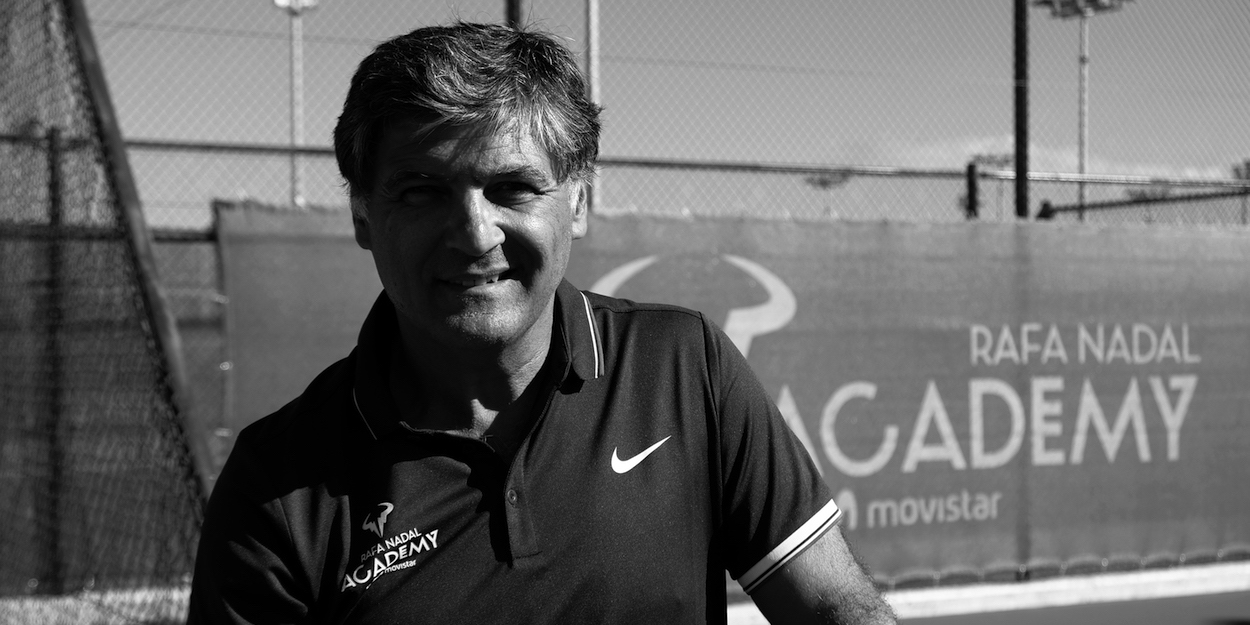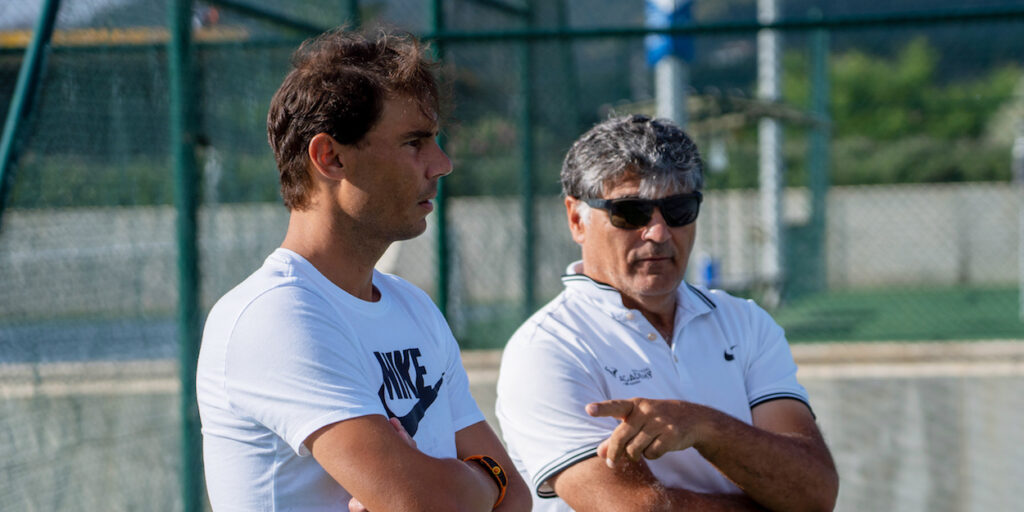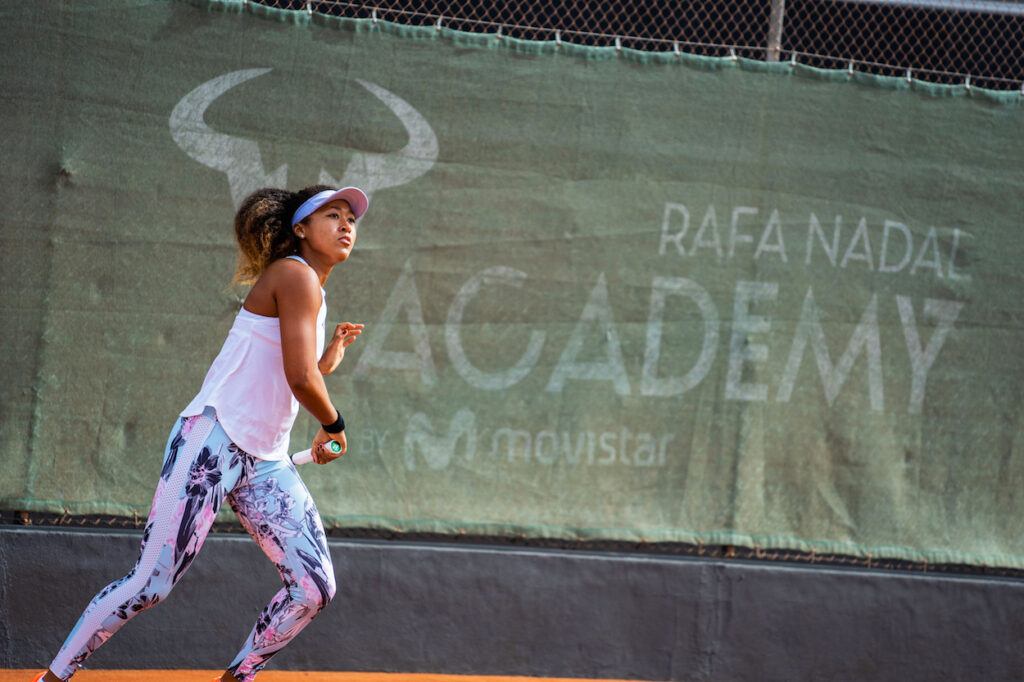
“We treat everyone here the same” Exclusive interview with Toni Nadal, head of the Rafa Nadal Academy
Toni Nadal knows that only a handful of his 130 students will go on to enjoy professional careers, but he aims to ensure that they are all given equal attention
The coronavirus pandemic has been a challenge for elite players the world over, from juniors hoping to make their mark on the international stage to seasoned professionals wondering when they might return to work, but for the youngsters at the Rafa Nadal Academy in Mallorca it did at least bring one bonus. Although the students were unable to practise for several weeks and could not compete in tournaments until late in the summer, the lockdown provided a regular opportunity to watch one of the greatest players in history at work – and even to get on court and hit with him.
“For three months Rafael was practising every day with the kids from the academy,” said Toni Nadal, the world No 2’s uncle and former coach, who now heads the academy. “It’s very good for the kids to have good players training here. When I practised with Rafael when he was young we never had the possibility to practise regularly with professional players. Sometimes Carlos Moya came to the club where we practised and that was very good for Rafael.
“Now the youngsters at the academy can often see players like Rafael, Jaume Munar or Casper Ruud. Caroline Garcia has been practising here regularly. Grigor Dimitrov and Pablo Andujar were also at the academy this summer. For the young to have the possibility to watch these players is unbelievable. They can be an inspiration for them – and the kids also have the chance to practise with them.”

The professionals eventually resumed their travels when the tours restarted in August, but it will not be long before some are back making preparations for what they hope will be a less disrupted year in 2021. When they return they will find the academy as busy as ever. Earlier in the summer there had been fears that the number of students enrolling for 2020-21 would drop, but once again the academy has about 130 young men and women making full use of its international school and outstanding facilities.
Contrary to early expectations, the academy’s summer camps were also well attended this year. “We thought in May that it would be difficult because of the coronavirus,” Toni said. “There were times when it was very difficult for people to travel around Europe, but in the end the summer camps worked out well for us.”
There has not been a single coronavirus infection at the academy, where health issues have always been taken seriously. When Spain went into lockdown early in March, staff contacted the families of all the live-in students – who come from 42 different countries – to see if they wanted assistance sending them home. Some left, but 85 stayed. They were subsequently confined to the complex, along with 70 academy employees. Everyone had their temperature taken twice a day, strict social distancing was enforced and extra hygiene measures were put in place.
Although the students were unable to compete in international tournaments for several months, Toni does not think that will have any lasting effect on their development. “It’s been the same for people all over the world,” he said. “I think it will have been a bigger problem for some older professional players. For younger players it’s easier when you are in an academy. If you’re just practising at a small club it can be difficult to get matches. We have 130 kids here so they have had many possibilities to play matches at the academy, even if they would have preferred to play tournaments.”
Strict health protocols are still in force. “The kids play without masks but when their practice has finished they have to wear them,” Toni said. “Coaches always have to wear masks. We make sure that we keep our distance. We limit the numbers of people in the locker rooms, in the classrooms and in the dining room. People have to attend in small groups and they all have their allotted times, so there are never a lot of people together.”

The academy, situated in the Nadals’ home town of Manacor, opened only four years ago. When the latest phase of construction work is finished in January it will have 23 hard courts, including four indoors, and 22 clay courts, of which seven will be under cover, as well as 13 padel courts, two squash courts, two swimming pools, a football pitch, a fitness centre and a spa.
A number of the academy’s students have been making rapid progress. They include two of the most promising Spanish juniors in Ariana Geerlings, who won an ITF tournament in Barcelona in September, and Raquel Caballero, who won this summer’s Spanish under-16 championship. Alex Eala, from the Philippines, won the Australian Open girls’ doubles title at the start of this year and climbed to No 4 in the world junior rankings, and Britain’s Matilda Mutavdzic won an ITF title at Melilla in Spain.
Another British player, Max Basing, was among those who got to hit with Rafael Nadal this summer, while Bjorn Borg’s 17-year-old son, Leo, has also been at the academy. “He’s a good player but of course it’s difficult for him because of comparisons with his father,” Toni said. “He has a lot of power and a good body. I think he can be a professional tennis player.”
Toni believes one of the major reasons for the academy’s success is the quality of the coaching team which he leads. Carlos Moya, who coaches Rafael Nadal, is the technical director, while the head coaches are Gabriel Urpi, Marc Gorriz, Joan Bosch, Joel Figueras and Tomas Prieto. Urpi’s experience is typical: after coaching Arantxa Sanchez Vicario when she won the French and US Opens in 1994 he went on to work with, among others, Conchita Martinez, Flavia Pennetta and Elina Svitolina. Before joining the academy Urpi worked with Amelie Mauresmo at the French tennis federation.
“Technology, analysis, bio-mechanics, they are all important, but in the end what always makes the difference is people,” Toni said. “We have many good coaches here. That is our strength, along with the passion that we have for our work.”
He also stresses that the academy aims to provide a memorable experience for all its students. “We try to give the same attention to everyone, not just the best players,” Toni said. “Out of 130 players here, maybe only five or 10 will become professional players. We want everyone who has been at the academy to be happy that they spent a couple of years here. When I was coaching at a small club in Manacor, practising with Rafael was very important for me, but the other kids there were just as important. It’s the same here at the academy.”
For more information visit RafaNadalAcademy.com
- Join the tennishead CLUB and receive £250/$350 of FREE GEAR including ASICS Gel-Resolution 8 trainers, shorts, shirt & socks
- Keep up to date with the breaking news & tennis action at our tennis news section
- Win amazing prizes by entering our competitions
- Learn more about your favourite players including Roger Federer, Rafa Nadal and Novak Djokovic
- Check out the latest tennis equipment with our tennis gear reviews
- Receive regular updates in our legendary free newsletter
- Read in depth features with stunning photography in tennishead magazine
- Can’t visit the tournaments you love? Check out our guide on how to watch tennis on TV
- Don’t miss a thing with our Live Scores service
- Follow tennishead on social media at Facebook, Twitter, Instagram & YouTube
- EXCLUSIVE 5% DISCOUNT for all tennishead readers on tennis rackets, balls, clothing, shoes & accessories with All Things Tennis, our dedicated tennis gear partner


